Although we love burgers, a seared steak or even a weeknight chicken cookout, ribs on the grill are the ultimate treat. They’re messy, indulgent and delicious—and they turn an ordinary summer afternoon into a festive occasion.
When learning how to grill ribs, it may seem intimidating because they require more time over the coals than many other types of meat. Here’s the truth: Because they cook low and slow, they actually have a wider window of perfection than something like a T-bone steak that relies on a savvy sense of timing and temperature. If you take some time to prep ribs correctly and learn where to cook them on the grill, then they’re easy enough even for beginners.
How to Choose the Best Ribs
Don’t just grab any pack of ribs at the store and run. Different types of ribs have different flavor and texture and, thus, cooking techniques. Here are the three most common types of ribs:
- Baby back ribs are the most common and easiest to find. They are smaller, meatier and leaner than other types. These are the ribs we’ll cook in the how-to below.
- Spareribs are larger with flat bones. They have more connective tissues, so after a long cooking time, they’ll get very tender.
- St. Louis-style ribs are spareribs with the rib tips removed. They have a more uniform, rectangular shape than the other types. They’re trickier to cook, so you might want to start experimenting with baby backs or spareribs first.
Ingredients for Grilled Ribs
Meat:
- Baby-rack ribs
Marinade:
- Chicken broth
- Soy sauce
- Sugar
- Cider vinegar
- Olive oil
- Garlic cloves
Spice rub:
- Salt
- Paprika
- Chili powder
- Pepper
- Garlic powder
- Cayenne pepper
Directions
Step 1: Prep the meat
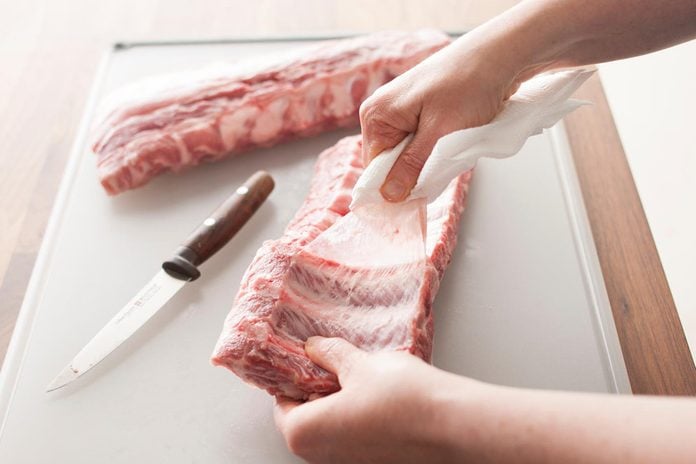
Most store-bought ribs have what’s known as silverskin, a membrane over the underside of the ribs. Sometimes, if you’re lucky, the butcher will remove it for you. Otherwise, you need to remove it before you cook. Don’t panic, it’s simple to do.
Insert a knife between the membrane and the meat at one end of the ribs. Be careful not to pierce the membrane. Work your fingers under the skin to loosen it. Now you’re going to tug it off. Wrap a paper towel around your hand so you can get a good grip. Gently but firmly, pull off the silverskin. It should peel off quite cleanly.
Step 2: Make the marinade
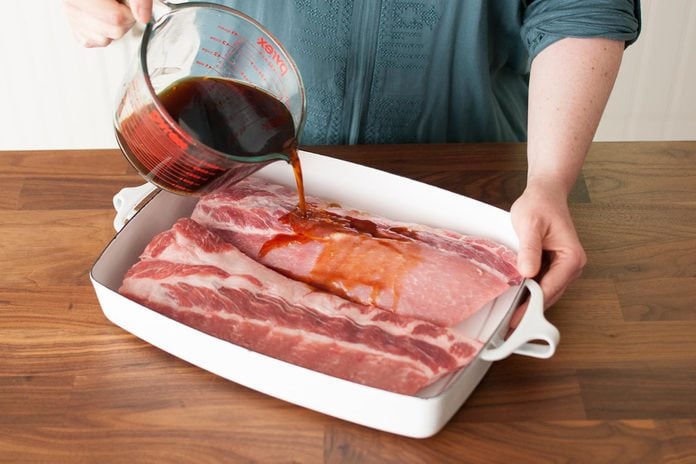
Pork is tasty as is, but marinating before cooking ribs on a charcoal grill enhances the flavor. It adds a deep savoriness that makes the meat more satisfying and delicious.
Combine the broth, soy sauce, 1/2 cup sugar, vinegar, olive oil and garlic in a bowl or measuring cup with a pour spout. Place the ribs in a shallow baking dish, like a 13×9 pan. Pour two-thirds of the marinade over the meat. Turn to coat both sides, then refrigerate overnight. Turn the meat occasionally, to ensure that the meat is marinading evenly. (No need to get out of bed to do this. Just turn at night just before bedtime and turn again in the morning.)
Don’t toss that remaining marinade. Cover and refrigerate it. You’ll use it while you’re grilling.
Step 3: Treat the meat to a spice rub
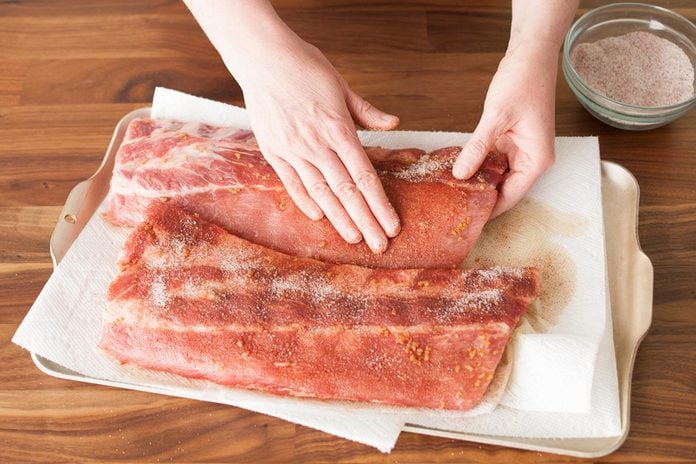
Trust us: You want to add the spice rub. Like making the marinade, it’s simple to prep, just tossing some ingredients together in a bowl. Here, we use the remaining ½ cup sugar, plus salt and seasonings.
Take the ribs out of the fridge. Drain and discard the marinade from the 13×9. Pat the ribs dry (this helps the spice rub stick). Rub the spice mixture over all sides of the ribs, patting with your fingertips to encourage it to adhere.
Step 4: Grill
Here’s the real secret on how to grill ribs: Cook them over indirect heat, and give them time. This lets the connective tissue melt away, leaving you with perfectly tender, toothsome ribs. If you cook them too quickly, over high heat, the meat can turn out chewy and tough.
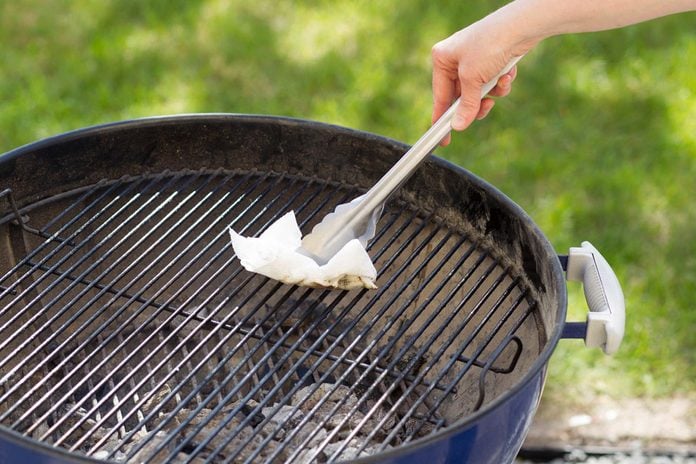
First, preheat a clean grill to medium heat (about 200°F), then oil the grill.
Place the ribs right on the grill, using tongs to maneuver them into place. Grill, covered, over indirect medium heat for 30 minutes on each side.
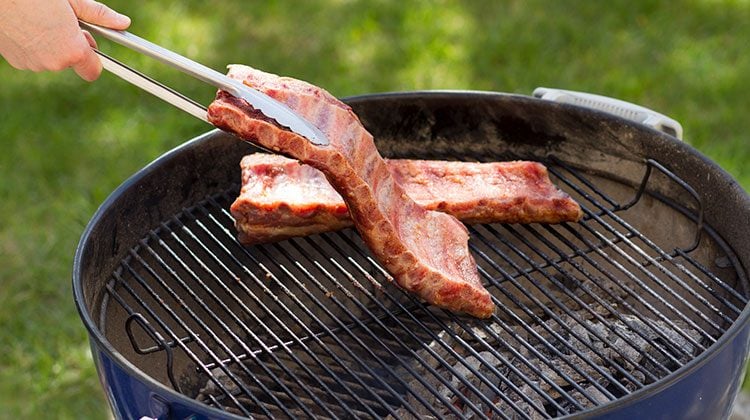
After the first hour, move the ribs to direct medium heat and cook 20 to 40 minutes longer, or until the pork is tender (more on this in a minute).
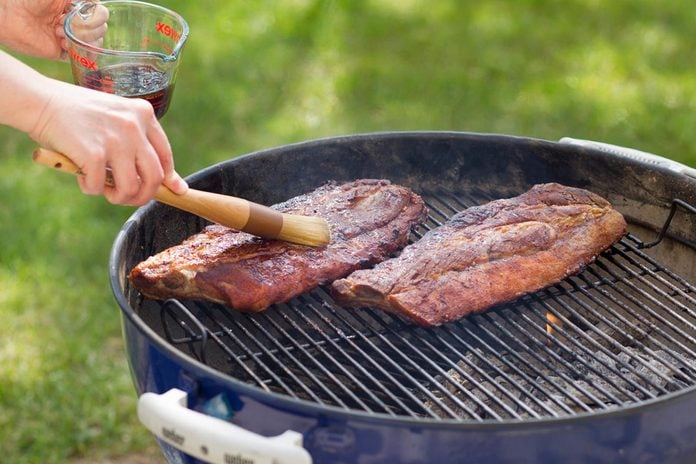
Occasionally, turn and baste with the reserved marinade (or barbecue sauce, if you prefer).
Test Kitchen Tip: Once you start to baste with the sauce, keep a watchful eye on it in case the sugars start to caramelize (brown) quickly. You’d hate to burn the ribs now after all your preparations up to this point. This is why we wait to baste until the end of the cooking time.
Step 5: Test for doneness
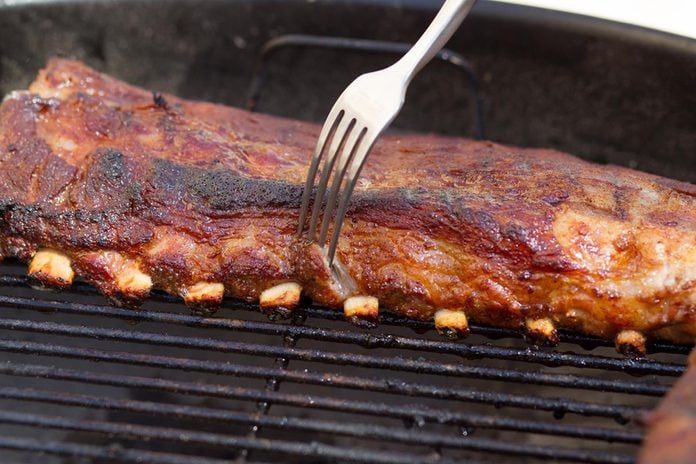
Start testing for doneness once the meat begins to pull away from the ends of the bones. This visual cue means it’s time to test. Pierce the meat with a fork and the tines should glide through easily. You also can twist a rib bone a little bit; you should feel it move easily but not fall apart from the meat. If the meat falls off the bone, your ribs are overcooked. Remove from heat right away and make sure to have sauce at the table in case they’re a bit dry.
Overall, ribs should be cooked to a temperature of about 190°. This high temperature melts the tough collagen in muscle fiber, resulting in a tender rib. To take the temperature of your ribs, insert a meat thermometer into the meat, being sure not to pierce all the way through the meat or touch the bone.
Step 6: Let rest
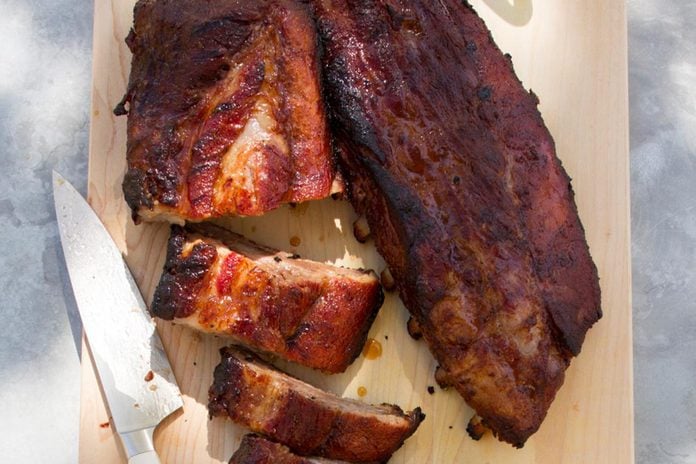
Let your ribs rest for 10 to 15 minutes, then split them up into manageable portions. Using a sharp chef’s knife, carefully cut them into two-bone sections. Make the cuts as close to the bone as possible so there’s a lot of meat on each one.
Grilled Ribs Tips
Do I have to make a marinade?
Seasoning your meat in advance gives the meat time to take on the flavors. This means you’ll serve up a meal that’s already delicious, even if you don’t add salt or barbecue sauce at the end. (OK, we’d never skip the sauce, but it’s nice to use the sauce as a highlight rather than as a coverup for bland food.)
Do I have to use a spice rub?
When it comes to ribs, some people only use a marinade. Some people only use spice rub. We like to do both! Marinading adds layers of flavor that penetrate deep into the meat, while the spice rub adds flavor to the surface of the meat. When the grill sears the ribs, the spicy, crackling exterior of the meat makes a delicious contrast to the tender, succulent meat inside.
How do you serve ribs?
Serve with corn on the cob, big glasses of lemonade and a fistful of napkins for everyone. If you’re looking for more sauces to slather on your ribs, here are a few of our favorite homemade BBQ sauce recipes.
Should ribs fall off the bone?
We’ve all heard the old saying: Ribs should “fall off the bone.” But should your ribs really fall off the bone? Our Test Kitchen experts say no. We can all agree that chewy ribs are no fun, but if the meat is literally falling off the bones, then the ribs are overcooked and might be dry.




















